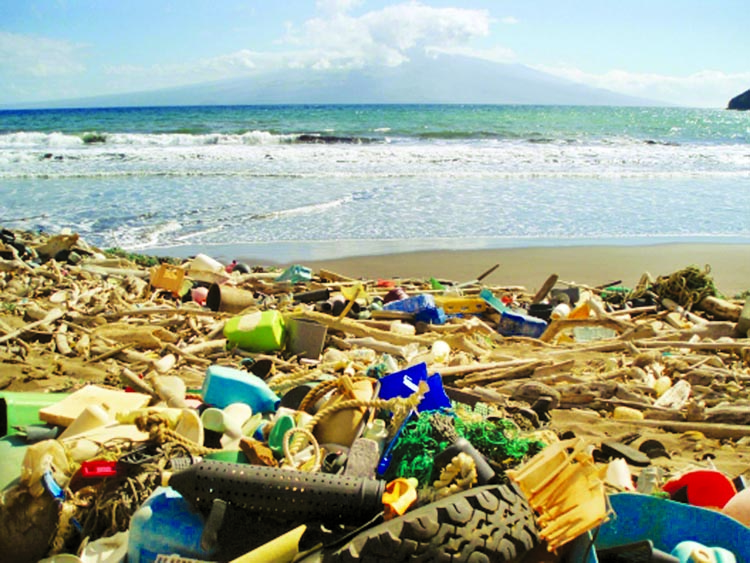
Gazi Anowarul Hoque :
Marine ecosystem is now under serious threat as non-biodegradable trash and debris, much of which comes from plastic and fishing nets, have been dumped by the influential quarters in the Bay of Bengal due to lack of surveillance of the authority concerned, said experts.
They said, the marine debris also threaten coral community and other important habitats, especially adjacent to Saint Martin’s Island from different sources.
Professor Dr Md Kawser Ahmed, Chairman of Oceanography Department, University of Dhaka told The New Nation on Monday that though Bangladesh is the biggest delta on Earth and has one of the largest natural sandy sea beach, it is heavily threatened by the impact of trash due to over population.
“Thousands of rivers are going across my country and ending up being at the ocean. So, the
trash being thrown in the rivers (intentionally or unintentionally) are ultimately going to the ocean,” he said.
He emphasised the need for protecting the Bay of Bengal from marine debris. For this, he said the public awareness is a must for marine ecosystem.
Marine debris comprises consumer items such as glass or plastic bottles, cans, bags, balloons, rubber, metal, fiberglass, cigarettes, and other manufactured materials that end up in the ocean and along the coast.
They also include fishing gear such as line, ropes, hooks, buoyas and other materials lost on or near land, or intentionally or unintentionally discarded at sea.
In this context, Abu Naser Khan, Chairman, Paribeash Andolon Bangladesh (PABA) told this reporter that Bangladesh has many beautiful and numerous laws to protect sea health like Bangladesh Environment Protection Act 1995, Bangladesh Wildlife (Preservation) (Amendment) Act 1974, Marine Fisheries Ordinance 1983, Marine Pollution Ordinance 1989.
But, he said, there is no implementation of the laws in practical. Most of the marine pollution came to effect by the influential quarters due to lack of surveillance of the authority concerned. So, environmentally we are to pay for bio-diversity.
Coordinator of Dive Bangladesh and Diving Expert SM Atiqur Rahman said scrap of iron piece; metallic fragment and other refused materials; oxidised iron, foam, pieces of wood and partex, glass wool, PVC, PCBs, black tar, grease balls and oil film and many other toxic chemicals left in the beach for a long time and accumulated in the beach soil finally get washed into the sea.
“In a bid to create awareness among the islanders and tourists about dangers of marine debris, every year we drive sea clean up programme since 2005. In the early days we would retrieve over 260 Kilograms each round by two divers, but at present we have documented near double. The government should take immediate steps to make public awareness about ecosystem,” Rahaman opined Experts say, marine debris comes from both land and sea-based sources and can travel immense distances. It also injures and kills wildlife, has the potential to transport chemical contaminants, and may pose a threat to human health.
According to the Global Program Action Report 2005 under UNEP, the quantity of solid waste generated by the costal populations of South Asian Seas (SAS) region is 11,650 tons per day. In Bangladesh, only a fraction of the solid waste generated is collected. It is estimated that about 9,000 metric tons of human waste are released along the coast from Chittagong and Khulna.
If this pollution continues, it will certainly destroy important habitat and biodiversity; drive many wildlife species near to extinction; destroy mangrove forests; cause the whole ecosystem to become unbalanced and hinder sustainable development. For our survival and sustainable development, it is time to comply with the duty to protect marine environment and adopt laws and regulations to prevent, reduce and control pollution of marine environment, the report added.
Statistics shows that every year 60-65 ships are being dismantled or awaiting dismantling process in the Chittagong and Khulna shipbreaking units. It has turned into an industry in which thousands of workers are employed. More than 150 companies are engaged in this business and the indiscriminate expansion of ship breaking activities pose a potential threat to the coastal inter-tidal zone and its habitat.
Convention on Biological Diversity report-2010 says, plastic debris is unsightly; it damages fisheries and tourism, kills and injures a wide range of marine life, has the capacity to transport potentially harmful chemicals and invasive species and can represent a threat to human health. It increased by 40 percent in the last decade.
A survey conducted by South Asia Co-operative Environment Programme says Marine plastic pollution has spread to become a problem of planetary scale after only half a century of widespread use of plastic materials, calling for urgent management strategies to address this problem.

